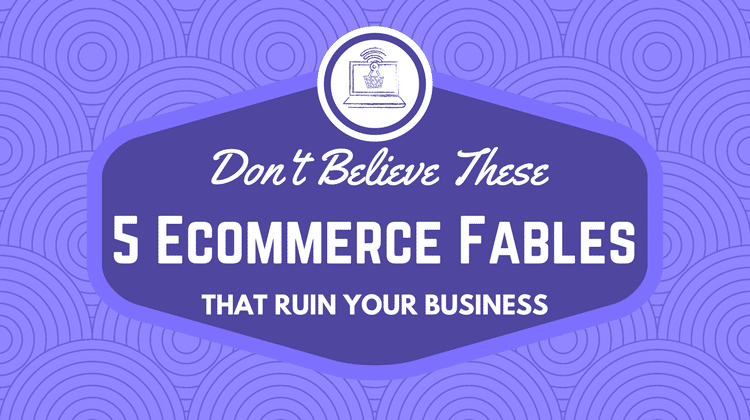
Setting off into the wonderful world of ecommerce is exciting, but it can be hard to cut through all the ‘noise’. With all the industry experts, publications, and bloggers out there vying for your attention – how do you know who (and what) to believe? Learn as much as you can and learn from others, but don’t believe everything you read online!
Here are six common ecommerce misconceptions that business owners get caught by. Don’t let that be you.
1. Logistics? I’ll Do That Later…
It’s staggering how many new ecommerce merchants neglect logistics, thinking it will be easy to set up. Logistics take planning, hard work, and dedication – and they won’t magically fall into place.
Good ecommerce logistics will ensure that when your business grows, it grows in the right direction. A bad logistical framework will lead to an inefficient and unprofitable business.
- Besides your product offering and customer service team, logistics will have the most direct impact on repeat customers. Going above and beyond with product delivery will be felt in sales figures.
- Accurate sales data and inventory management will help you run a smooth logistical operation from day one. Invest in good software and staff, or outsource supply management to a trusted firm.
- Automation, drop-shipping, and outsourcing are great, but they don’t mean that you can be entirely hands-off. You need to manage customer experiences and keep a handle on final product delivery. Spot checks and mystery shoppers can help you test your own processes.
- Don’t forget to map out a robust returns framework. Delivery frustrations at this stage can sour an already fragile customer relationship.
2. I’ll Just Buy Some SEO
There is no ecommerce platform out there that you can purchase and will magically get your store ranking on search engines. The truth is – SEO is hard and will involve a commitment of your time and money.
An investment in SEO is a direct investment in your store’s future sales figures. Though organic rankings take a while to build up, they provide much needed web traffic that you haven’t had to purchase via advertising.
- Publishing quality content that is unique and holds plenty of user-value is a very important ecommerce SEO strategy, and quality content doesn’t come cheap. Invest in good product descriptions, sales copy, and bloggers to help your store stand out.
- Technical SEO audits of your website can help uncover any deeper issues like broken links or crawl errors. These SEO issues crop up on all large ecommerce websites from time to time and need to be addressed on a semi-regular basis.
- Raising local awareness is another important SEO tactic for ecommerce merchants and retailers.
3. Omnichannel = Omni-Sales
Omnichannel as a retail strategy is incredibly powerful, but you have to understand how to implement it properly. Just popping up on different channels here and there without a coherent strategy won’t do your brand any favors.
- Be clear on where sales are best made. Go back to your buyer personas and their shopping habits. Don’t run after fads – you’ll run the risk of diluting your brand and frittering away your marketing budget.
- A good omnichannel strategy is anchored in a great customer experience – not a desire to sell more things. Sales follow great experiences. That’s what you need to be chasing as you transition from one environment to the next. Work with the environment you’re in to maximize returns. Adapt and grow your sales strategies to match the medium, but keep your branding consistent.
- Apps are a great way to improve mobile sales. Here are five reasons why you should consider an app for your business.
4. Offline is Dead
Branding exists in people’s minds. It extends way beyond your online logo and your website’s code. To make a true success of an online business, you have to engage with the offline world too. Pound pavements, do market research, and survey your competitors.
- Speak to your customers and meet the people who actually buy your products. You’ll learn loads about your own brand through them – your brand is what they make of it.
- For online businesses, packaging is a super important consumer touchpoint. Make sure yours is saying all the right things. Luxury products need to have especially great packaging. Innovative touches and surprising materials can go a long way.
- Use local events like pop up markets, seasonal fairs, and business showcases to create an important offline arm for your business. Don’t forget to grow your personal brand in the local business community through networking, referrals, and corporate events.
5. It’s Easy, Passive Income
Anyone who has stayed up until 4 AM, scrambling to get customer orders put together in time, will know that income is not always so ‘passive.’
- Though ecommerce is a good work-at-home career option, it doesn’t mean that you can be any less professional about it. Customers will expect high levels of care and attention, so be ready to answer queries on the phone, on social, and via your website 24/7! There are tools and services to help you manage and scale this process, so you won’t always have to be awake and serving customers.
- All the ecommerce software, automation, and platforms out there will help you manage your business, but they won’t run your business for you.
- Online markets are seasonal and volatile; competition is tough, and though margins are healthy, it can a be a constant struggle to drive traffic and sales. Be prepared to invest in marketing, and be conservative with forecasting.
What’s the best ecommerce business advice you’ve heard lately?
About the Author
Kayleigh Toyra is a professional multilingual writer and content marketer who specializes in digital and SEO copywriting.